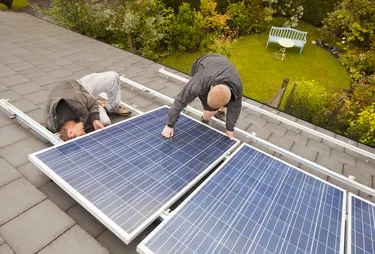
Although solar power hasn't overtaken fossil fuels as a source of household energy, solar panels have grown in popularity over the past decade. Today, the U.S. Department of Energy estimates that solar energy makes up an estimated 3 percent of U.S. household electricity, with that number expected to grow. Installing solar panels can be pricey, but homeowners can recoup that cost in decreased electric bills and improved home value.
Cost of Solar Panels
Video of the Day
Solar panels cost less than they did 10 years ago, but they still come with substantial up-front costs. You can have solar panels installed for as little as $5,000, but if you want a top-tier system, you'll pay $40,000 or more.
Video of the Day
The good news is, both federal and state government agencies offer tax incentives that can offset some of the installation cost. In 2022, the federal government will issue a tax credit of 26 percent of the system cost, dropping to 22 percent in 2023. There are also local government rebates that can help. The average homeowner will pay $12,000 for solar panel installation after rebates and incentives.
Average Energy Costs
Before looking at how much do solar panels save, it's important to consider your current energy bills. Utility bills vary based on factors like location and system size, so it's best to consider your own monthly bill.
According to the U.S. Energy Information Administration (eia), the average U.S. monthly electricity cost is 13.83 cents per kilowatt-hour. It goes as low as 9.64 cents per kWh in North Dakota to 38.15 cents in Hawaii. In 2020, the average U.S. electricity use was 893 kWh per month, which means electricity prices average around $125 a month.
How Much Solar Panels Save?
Going solar can cut your electricity usage, but your savings amount will depend on a few factors. First, there's how much energy your household uses, as well as what electricity rates are in your area. The size of the solar system you choose is also a factor since smaller systems will require you to rely on traditional energy sources more than top-tier systems.
When you weigh the initial cost against energy savings, it's important to consider how long you'll be in your home. If your utility bills average $125 a month and your new system replaces that completely, that's $1,500 a year you won't be paying your utility company. But it would take you 10 years to recoup the cost of a $15,000 solar energy system installation.
Smaller solar investments like solar-powered motion sensor lights might be a better way to cut costs. Some homeowners also choose solar panels specifically as an energy source for pool heaters or hot tub electricity to reduce energy usage at a lower cost. You can also set up budget billing to get a more predictable monthly utility bill.
Installing solar panels can be pricey, but homeowners can recoup that cost in decreased electric bills and improved home value.
Solar Energy and Home Value
Another consideration when thinking about buying a solar panel system is the increase it brings to your home value. Renewable energy is a selling point, especially if you live in an area that's sunny most of the year. If you haven't claimed all due tax breaks, the homeowner will be able to claim those for that tax year.
But the solar panels themselves might not be the thing that sells your house. Many potential homebuyers research the monthly electric bill before looking at a house. If your average utility costs for the year are lower than other houses within the same price range, it could be the deciding factor for someone who's interested in your house.
A solar power system can dramatically cut your monthly household expenses, but installation can be quite pricey. Look at your monthly utility bills and calculate how long you'll stay in the house to determine just how long it will take you to recoup what you spend to have the panels installed, minus any rebates or tax credits.